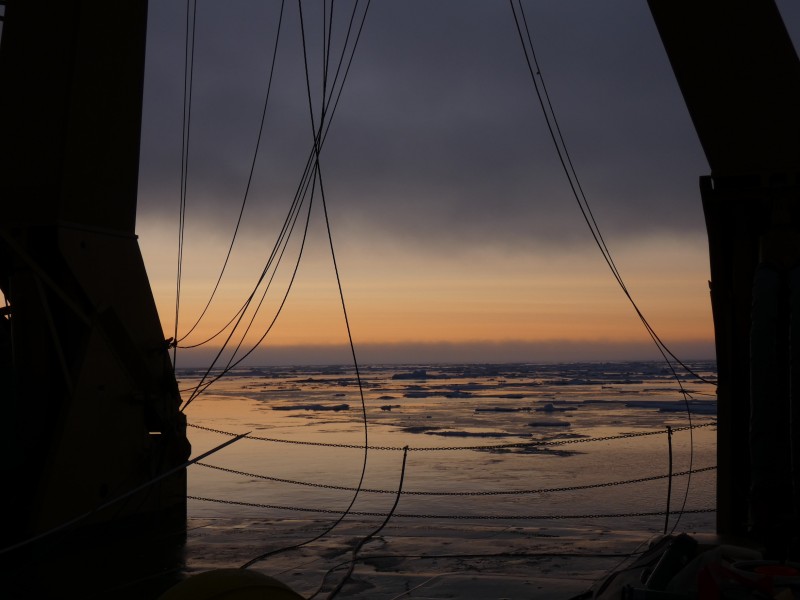Pacific water eddies: Summer placement at WHOI
Ryan Scott
British Antarctic Survey

Picture Caption: Arctic sunrise at the Chukchi Shelf break, framed by the USCGC Healy’s aft A-frame.
Report:
I would like to start by thanking the Challenger Society for contributing towards my travel expenses to Woods Hole Oceanographic Institution (WHOI), where I completed a 3-month summer project from June to August 2018. It’s safe to say that my time at WHOI absolutely flew by, a consequence of hard work, lots of fun and great people!
My project involved working with Dr Bob Pickart to improve our understanding of the dynamics of Pacific water eddies in the western Arctic Ocean. This involved analysing a high-resolution XCTD (expendable conductivity-temperature depth) and ADCP (Acoustic Doppler current profiler) survey that completely bracketed a cold-core, Pacific-origin, anti-cyclonic eddy on the Chukchi Sea Shelf, western Arctic Ocean. Using these data, we are able to shed some light on the origin and fate of these Pacific-origin eddies, which are ubiquitous in the Arctic Ocean (a paper is in prep. – Challenger will for sure be acknowledged!). These eddies are thought to freshen the upper part of the water column, a process that is critical for maintaining stratification in the Western Arctic, shielding sea ice from the underlying warm salty Atlantic water.
As my WHOI project involved studying the Chukchi Sea, I was lucky enough to be asked whether I would like to spend my third month aboard the USCGC Healy in the Chukchi Sea – being a physical oceanographer, I jumped at the opportunity! The cruise was a great experience; not only did I gain valuable experience at sea, there was great synergy between my project and the physical oceanography aspect of the cruise, and we even saw a polar bear!
Overall, suspending my PhD and working at WHOI was a fantastic experience and I’d thoroughly recommend it to anyone who has the opportunity. I was able to broaden my oceanographic knowledge (by studying the other pole!), get valuable cruise experience and have a taste of living abroad. It wasn’t something that I envisaged beforehand, but my time at WHOI was made even more enjoyable by the people that I met along the way – the PhD students and postdocs that worked in my department, and the 30+ Summer Student Fellows that I had the pleasure of living with. I’ll be sure to keep in touch with them, who knows, maybe they’ll even be future collaborators!
Picture Caption: A pre-cruise BBQ send-off - a great way to end living for 2 months with these guys!
Profile:
Ryan Scott is a PhD student going into his 3rdyear of a PhD the British Antarctic Survey. His project is funded through NEXUSS and is partnered with the University of Southampton. His project involves using turbulence data collected by underwater gliders to investigate mixing and heat fluxes in the west Antarctic.
Latest News
Royal Society Publishing Photography Competition 2025
Please see a message from the Royal Society below:
We are delighted to announce that the 2025 Competition is now open for entries until 15 August for a chance to win £1000! The competition celebrates the power of photography in conveying the wonder of science happening all around us and photographs can be submitted in the categories of: Astronomy, Behaviour, Earth Science and Climatology, Ecology and Environmental Science, and Microimaging.
The competition is free to enter and open to anyone studying or working in science at graduate level or above. Category winners will receive a one-year membership to the Royal Photographic Society and the overall winner will receive a grand prize of £1,000. Find out more: https://bit.ly/RSPphotocomp
October 2025 MEDIN Workshop: Marine Data Management, Governance and the MEDIN toolset
The Marine Environmental Data and Information Network (MEDIN) are pleased to announce that registration is now open for the next occurrence of our popular free online training workshop: ‘Marine Data Management, Governance and the MEDIN toolset’ on the 13th – 17th October 2025 on OceanTeacher Global Academy.
Marine Data Management, Governance and the MEDIN toolset
The Marine Environmental Data and Information Network (MEDIN) and OceanWise are delighted to invite you to attend our popular free online training workshop: ‘Marine Data Management, Governance and the MEDIN toolset’ on the 19th – 23rd of May 2025.
